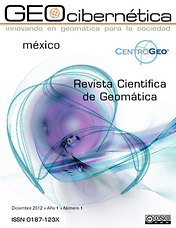Título
Geocybernetics: A pathway from empiricism to cognitive frameworks
Alias
121201-01-articulo
Portada

Autores
María del Carmen Reyes Guerrero, María Margarita Parás Fernández.
Año
2012
Fecha
2012-12-01
Categoría
Artículos
Identificador
ISSN: 0187-123X
Hipervínculo revisado
01 Septiembre 2021
Abstract
Many exciting events have happened from a scientific perspective over the last thirteen years since the foundation of CentroGeo in 1999. The Journal of Geocybernetics is a new venture focused on the publication of the scientific core of this avenue of research, extending an invitation to other networks and communities around the world that are exploring new knowledge in the realms of geomatics, geographic information sciences and the transdisciplinary work that is emerging as a result of worldwide efforts.
The term geocybernetics needs to be introduced and, therefore, some basic concepts are included in this initial paper. To help to convey the main message behind this avenue of research, the ideas are presented in an interactive and novel manner. An overview of the concept is illustrated by presenting the conceptual background, the disciplinary backbone that induced its emergence and its basic theoretical building blocks. The intent is that the concept will define itself through the publication of articles related to geocybernetics in the following issues of the Journal.
The scientific management model and the knowledge-based approach used in the empirical work strengthens a paradigm shift in the niche of "geomatics and society." Nowadays, most of the world's population lives in developing countries where the systematic collection and processing of data is scarce. The skills of local societal actors and geomatics scientists can contribute to develop scientific solutions to urgent problems such as poverty, health, safety and unemployment. The adoption of CentroGeo's methods and/or the publication of similar experiences in other countries, regions and communities could bring about a breakthrough in networking and sharing knowledge within geomatics.
The final section presents an explicit statement about the Journal, describing the main characteristics of this publication to potential authors.
The term geocybernetics needs to be introduced and, therefore, some basic concepts are included in this initial paper. To help to convey the main message behind this avenue of research, the ideas are presented in an interactive and novel manner. An overview of the concept is illustrated by presenting the conceptual background, the disciplinary backbone that induced its emergence and its basic theoretical building blocks. The intent is that the concept will define itself through the publication of articles related to geocybernetics in the following issues of the Journal.
The scientific management model and the knowledge-based approach used in the empirical work strengthens a paradigm shift in the niche of "geomatics and society." Nowadays, most of the world's population lives in developing countries where the systematic collection and processing of data is scarce. The skills of local societal actors and geomatics scientists can contribute to develop scientific solutions to urgent problems such as poverty, health, safety and unemployment. The adoption of CentroGeo's methods and/or the publication of similar experiences in other countries, regions and communities could bring about a breakthrough in networking and sharing knowledge within geomatics.
The final section presents an explicit statement about the Journal, describing the main characteristics of this publication to potential authors.

